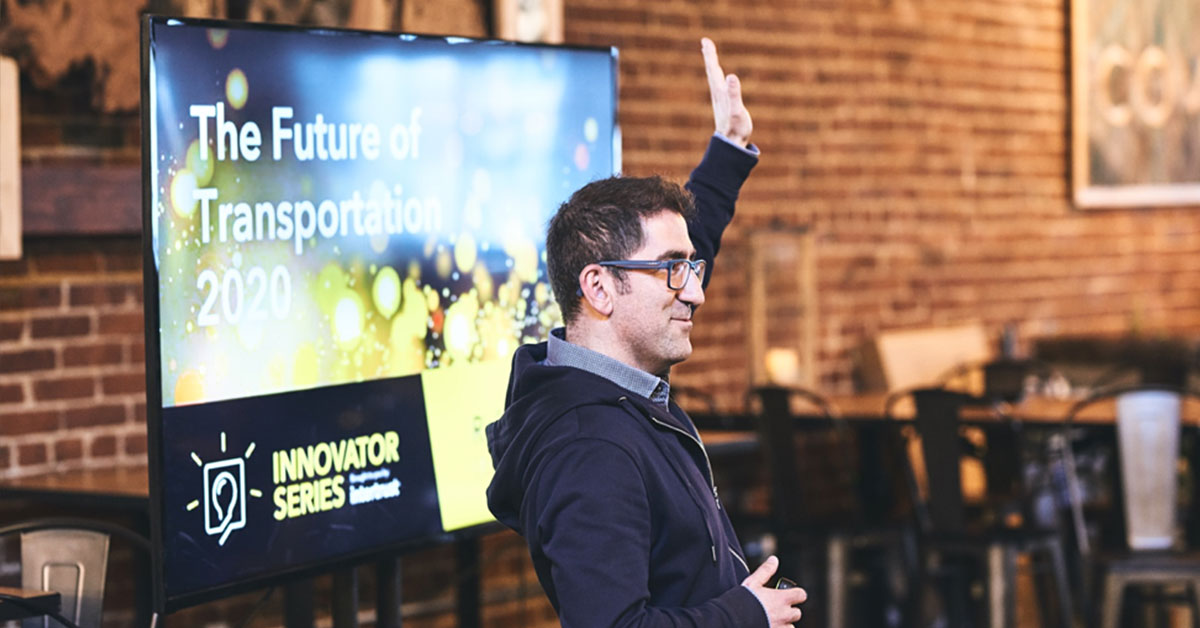Intertrust’s Innovator Series is an ongoing series of talks given by innovators on a number of topics important to the technology industry. As part of our series on the initial theme of “The Future of Transportation,” our first speakerwas Rafael Marañón, CEO of Wavyn. Wavyn is developing an app aimed at a very important part of our transportation future, improving driver safety. As Marañón puts it, even though cars kill about 1.3 million people a year worldwide, people accept it, but seem very concerned about aviation safety even when only about a 100 people in the U.S. have been killed in plane accidents over the last 10 years.
While some may say the solution is self-driving vehicles, experts hold widely varying on how soon truly automated vehicles will be on the market. And even when they do appear, there will be a period of time when human and robot drivers will need to coexist on the roads. Marañón pointed out that the transportation industry is working to improve traffic safety through measuressuch as improved barriers on roads, ADAS systems that help the driver steer and brake, and impending collision warning systems. “Still, 1.3 million peoplekilled is a lot. What else can we do?” (Marañón).
Marañón decided to look at helping solve part of the problem. He considered several things, one was that new cars have a life cycle of 11.4 years and that about 50% of drivers are using their phones in hands-free mode in their cars.Looking at the fact there are about 2.5 million rear end crashes in the U.S. in one year and most of those were caused by speeding and distracted driving, “the only solution is to change the behavior of the driver,” (Marañón).
The end result is the Wavyn app. Wavyn (in open beta at time of writing) is a smartphone app combining deep learning technology, image and motion sensor data, and a user interface designed for hands-free use, to warn drivers of dangerous conditions. Using data derived from image recognition of things like speed limit signs and road striping, Wavyn lets drivers know when they are speeding, moving out their lane, etc.
Marañón says that “deep learning is our core technology.” By using deep learning technology running locally on the phone’s microprocessor to analyze sensor data, Wavyn doesn’t need to rely on cloud processing and a network connection. This allows Wavyn to operate in locations where a wireless connection isn’t available. It also ensures that user data remains on the smartphone and under the control of the user, reducing the chances of privacy infringement.
In many ways, Wavyn’s app is a work-around for the startup to get into the automotive market. Marañón pointed out that unlike the smartphone industry, software interoperability across automotive OEMs doesn’t exist yet and sensor development and adoption is slower. But, Marañón believes that the future of automotive industry will likely be different as cars move to become more like “phones on wheels,” (Marañón) and software updates happen more frequently. It seems that Marañón is positioning himself and Wavyn to be in a strategic position as the automotive industry goes through its digital transformation.
Innovator Series
The Innovator Series, brought to you by Intertrust Technologies, serves the local Bay Area tech community. These thought-provoking conversations inspire the future of tech while empowering our collective community to engage with one another in an open forum.
About Phil Keys
Phil Keys is a Director, Comms & Research for Intertrust Technologies. He is a veteran technology industry observer, marketer, connector, and writer based in Silicon Valley. In addition to 13 years of experience as a Silicon Valley Correspondent for Nikkei Business Publications, Phil has worked for technology companies in both the US and Japan. Phil has spoken publicly in events in Tokyo and Silicon Valley as well as moderated panels in Silicon Valley. He holds a B.A. from the University of California at Berkeley and attended International Christian University in Tokyo.

